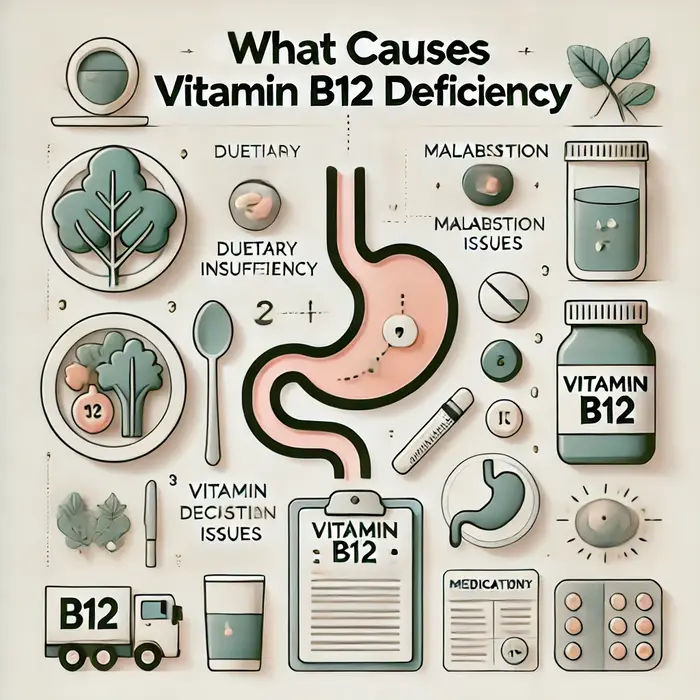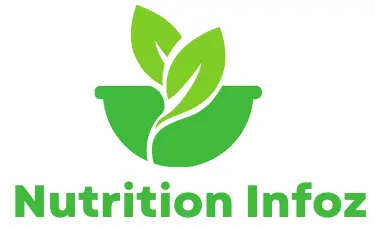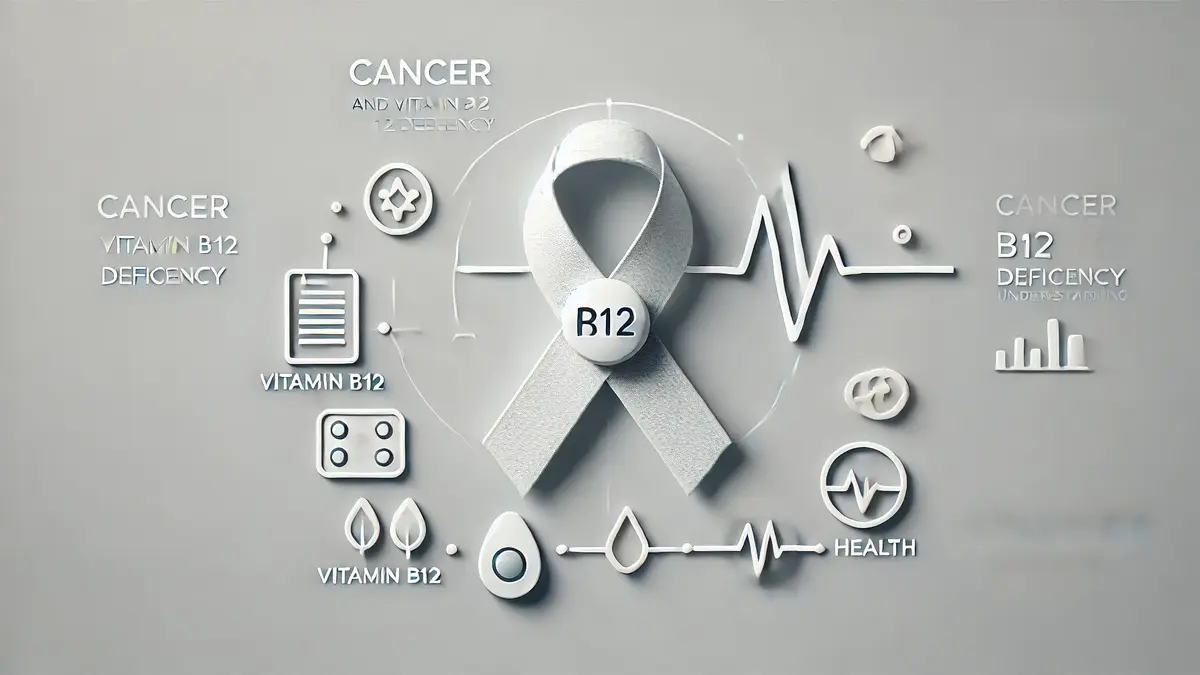Vitamin B12 lack represents more than simple dietary challenges; researchers increasingly look at it as a major health concern relating to cancer. We investigate the essential contribution of vitamin B12 to the body and discuss how lack of it can be displayed along with its concerning link to several types of cancer, such as breast and pancreatic cancer. Recognizing these elements is important for anyone at risk of deficiency and also for those with cancer who may need assistance from their caregivers.
It would help if you read this article because it reveals the frequently ignored relationship between vitamin B12 shortage and cancer, a risk factor that should not be overlooked. Recognizing these relations helps people learn about their health and the possible indicators they should track.
What is Vitamin B12 Deficiency?
Without enough vitamin B12 in the body, a deficiency condition named vitamin B12 deficiency may develop, which can also cause significant health issues. This shortage becomes more prevalent in old adults, vegans, and those having relevant health issues that disrupt absorption, all of which can increase the risk factor for developing cancer.
When vitamin B12 levels drop, low fatigue and weakness might appear, as well as pale skin and neurological issues that can cause numbness in the extremities, which may be a sign of cancer. In serious cases, the lack of healthy red blood cells may cause anaemia and diminish oxygen flow to body tissues, which can also cause complications in cancer patients.
How is Vitamin B12 Deficiency Diagnosed?
Measuring vitamin B12 levels in the blood usually helps identify deficiency. A vitamin B12 deficiency usually signals a problem, and the root causes can usually be identified, including those that may elevate cancer risk.
Reading vitamin B12 levels is crucial; although regular levels might differ slightly, levels under 200pg/mL typically indicate deficiency, highlighting the importance of absorption of vitamin B12. In certain instances, you might need further tests to determine why the deficiency exists due to diet or absorption problems, particularly in relation to the pancreas.
What Causes Vitamin B12 Deficiency?
A vitamin B12 deficiency occurs due to poor eating habits and multiple health challenges that may be tied to cancer. Eating a vegetarian or vegan diet puts people at greater risk because plant food lacks sufficient vitamin B12 levels.
The absorption of vitamin B12 varies due to intrinsic factors present in those with the autoimmune disorder pernicious anaemia. Intake of specific drugs and various illnesses of the digestive tract drop vital nutrient levels, affecting how well vitamin B12 is absorbed.

What is Connection Between Vitamin B12 Deficiency and Cancer?
Research shows that a shortage of vitamin B12 can encourage growth of specific cancer varieties, establishing a clear link to cancer. Without sufficient vitamin B12, the body may struggle to repair mutations that increase the likelihood of pancreatic cancer.
The absorption of nutrients often suffers for patients undergoing cancer therapy like chemotherapy, leading to an enhanced risk of vitamin B12 deficiency. Cancer patients must undergo testing for B12 regularly to stop potential complications related to their treatment, especially for pancreatic cancer.
What Types of Cancer are Linked to Vitamin B12 Deficiency?
A few types of cancer are connected to low vitamin B12 concentrations, like pancreatic and gastric cancers. Numerous forms of cancer show signs that are comparable to those in deficiency conditions linked to vitamin B12.
Patients should notice symptoms such as loss of appetite or unusual fatigue that may indicate cancer and vitamin B12 deficiency. Timely identification and treatment may greatly affect a patient’s results.
How Does Vitamin B12 Deficiency Cause Anaemia?
Once vitamin B12 levels fall past a particular threshold, it might trigger megaloblastic anaemia, in which the cells find it difficult to transport oxygen. Vitamin B12 within red blood cells is essential for the average growth of red blood cells; without it, the cells cannot function properly and may raise cancer risks.
Should vitamin B12 levels drop below normal, individuals may feel fatigued and pale due to a lack of vitamin B6 and other nutrient gaps. Rapid action is vital for regaining typical red blood cell production and eliminating those symptoms, especially for patients missing B12.
What Are the Neurological Implications of Vitamin B12 Deficiency?
Numerous signs of vitamin B12 deficiency include tingling in the extremities, issues walking, and brain fog. These signs emerge because the vitamin’s duty is to uphold nerve function, which is crucial in preventing neurological symptoms associated with cancer.
Without proper care, severe B12 deficiency can produce enduring damage to the brain and nervous system, potentially increasing the risk of developing stomach cancer through its association with cancer. Getting quick medical support and treatment is important for people showing deficiency symptoms, as vitamin B12 deficiency could lead to serious health issues.
Learn More: Proven Ways to Lose Weight Without Exercise or Diet
How Can Vitamin B12 Deficiency be Treated?
Treatment choices for a lack of vitamin B12 differ depending on the root issue, which may include considerations for cancer treatment and the role of vitamin B12. In instances of dietary insufficiency, dietary changes and starting vitamin B12 supplements can address the problem, reducing the risk of developing related health issues.
When digestive issues prevent adequate absorption of B12 for certain individuals, injections may enable direct delivery of the vitamin into the bloodstream, potentially lowering their risk of developing cancer. Cancer patients need frequent checks of vitamin B12 levels to guarantee their levels stay in a favorable state, as deficiencies can pose a significant risk factor.
Dietary Sources of Vitamin B12
A rich supply of vitamin B12 is found in items like dairy products, fish, and eggs, which are essential for the synthesis of healthy blood cells in the bone marrow, linking to cancer prevention. If you abstain from animal products but enjoy a balanced diet of fortified cereals and plant-based milk alternatives, you can get your daily Vitamin B12 intake, which is vital for preventing deficiencies that could lead to neurological symptoms.
For those prone to nutritional shortfalls and especially the elderly or those with troubles metabolizing food, laxatives are suggested to help improve absorption and reduce cancer risk. Supplements of Vitamin B12 take different forms including tablets and injections, which are essential for improving B12 absorption.

Summary: Key Takeaways on Vitamin B12 Deficiency and Cancer
- A lack of vitamin B12 results in major medical concerns like anaemia and brain disorders, which could have a link to cancer if not addressed.
- Successful treatment of deficiency typically requires early blood test results to monitor levels of vitamin B12 and assess risk factors.
- Some health issues can block the uptake of vitamin B12 and raise the chance of a deficiency, particularly in people with low dietary intake.
- A clear relationship exists between cancer and vitamin B12 depletion, particularly among patients in treatment for lung cancer.
- Reports of reduced vitamin levels can match the characteristics of cancer, indicating the necessity for ongoing evaluation.
- Depending on the extent of vitamin B12 deficiency, the therapist may suggest changes to diet or provide supplements, including vitamin B6 to aid in overall health.
- Animal products are the main source of vitamin B12, which is essential for individuals at risk. Those who need it most should consider supplementation, especially to mitigate the risk of developing conditions related to low B12.
- Cancer patients and people with absorption challenges must regularly check their vitamin B12 levels.
When individuals learn about the complexities of vitamin B12 deficiency and understanding vitamin B12’s ties to cancer, they can actively improve their dietary intake and self-care. Knowledge of signs and related risks can promote timely actions and boost results for individuals with these challenges.
FAQs
What is vitamin B12 deficiency and how does it relate to cancer?
Without enough vitamin B12 in the body, a deficiency disrupts the formation of red blood cells and the function of neurological health. This problem displays signs like fatigue and weakness, which could also be neurological symptoms of vitamin B12 deficiency. Insufficient levels of vitamin B12 could be linked to certain forms of cancer, including leukemia and breast cancer. Comprehending this relation matters for quick assessment and management, especially in terms of supplementation.
What indications show a lack of vitamin B12?
Different symptoms of vitamin B12 deficiency include fatigue and a swollen tongue, pale skin, and weakness, which can also be exacerbated by vitamin D deficiency and may be linked to an increased risk of cancer. Symptoms can also differ, and some may be linked to an increased risk of developing certain cancers, particularly in patients with B12 deficiency.
Along with balance issues and cognitive problems comes the potential for tingling or numbness in the hands and feet. Occasionally, low levels may cause anaemia, defined by a lack of red blood cells. Understanding these symptoms early is vital for establishing the diagnosis of potential underlying challenges and the chance of cancer, especially when considering the link between vitamin deficiencies.
How is vitamin B12 deficiency diagnosed?
Blood tests usually help ascertain vitamin B12 deficiency levels, which can indicate an increased risk of leukemia. Dentists may examine intrinsic factors because they help vitamin B12 enter the bloodstream effectively, which is crucial for reducing the risk of diseases, including breast cancer. Should levels fall below normal limits, further exams might be carried out to uncover what caused them, such as diet or absorption difficulties.
What types of cancer are associated with vitamin B12 deficiency?
Evidence suggests that several cancer forms, including gastric and pancreatic cancer, may relate to decreased levels of vitamin B12, which is caused by vitamin deficiencies. Reduced vitamin B12 levels might associate these cancers, such as lung cancer, with a greater risk of malignancy among people.




Leave feedback about this